The government of Ethiopia and the Tigray People’s Liberation Front (TPLF), the nation’s former ruling party now functioning as a rebel militia, confirmed that a truce that began in March had broken with major hostilities erupting on Tuesday.
TPLF leaders claimed on Tuesday that the Ethiopian government had launched a “large-scale attack” in the southern Tigray region. The Ethiopian armed forces confirmed active conflict on Wednesday but claimed that the TPLF had broken the ceasefire, not the government.
The war between the government of Prime Minister Abiy Ahmed, an ethnic Oromo, and the leadership of the TPLF, headquartered in the heartland of the Tigray ethnic minority, began in November 2020 after Abiy claimed that TPLF fighters had attacked a military strategic target. The TPLF, a Marxist political party, ruled the country from 1991 through 2018. Under Abiy, the Ethiopian government outlawed the TPLF as a terrorist organization last year.
Abiy has proceeded in the nearly two years since to entirely blockade the Tigray region, preventing food, medicine, and other basic goods from entering. Humanitarian aid groups and United Nations agencies have accused Abiy of not allowing critical food aid into Tigray and attempting to block reports of famine in the region. Abiy also personally took up arms in the war last year.
Human rights activists and foreign governments, including the United States, have accused Abiy of “ethnic cleansing” against the Tigray people. Tigray fighters have also been accused of committing human rights atrocities in the conflict, particularly against a third ethnic group, the Amhara people.
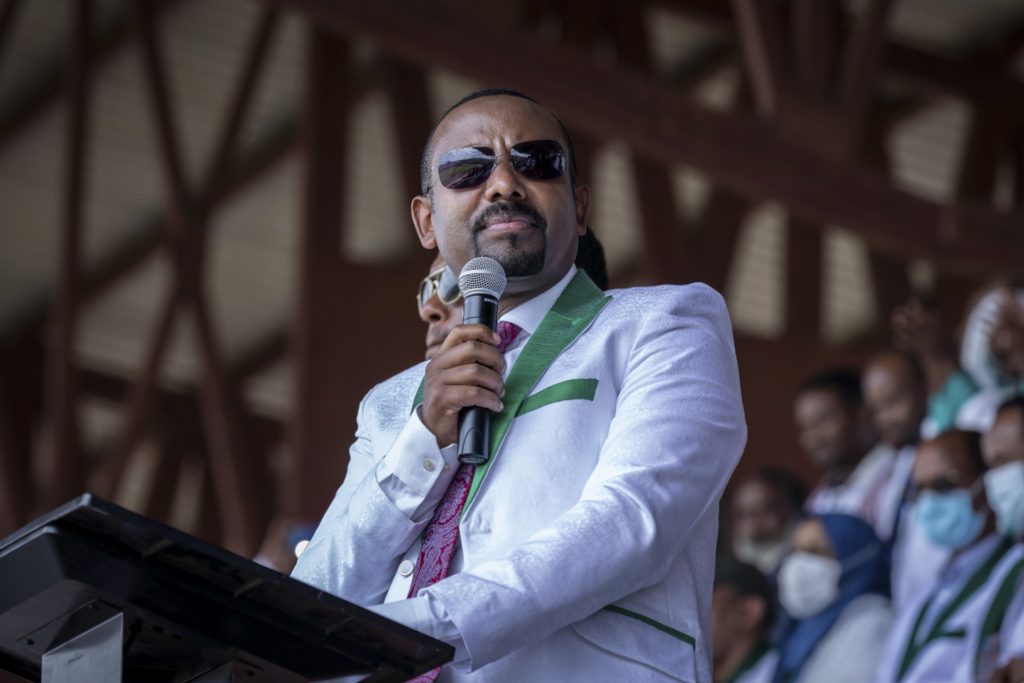
In this Wednesday, June 16, 2021 file photo, Ethiopia’s Prime Minister Abiy Ahmed speaks at a final campaign rally at a stadium in the town of Jimma in the southwestern Oromia Region of Ethiopia. (AP Photo/Mulugeta Ayene)
Abiy Ahmed won the 2019 Nobel Peace Prize for his work in ending the war between Ethiopia and Eritrea. The Nobel Committee has criticized Abiy but not revoked the prize since the current civil war began.
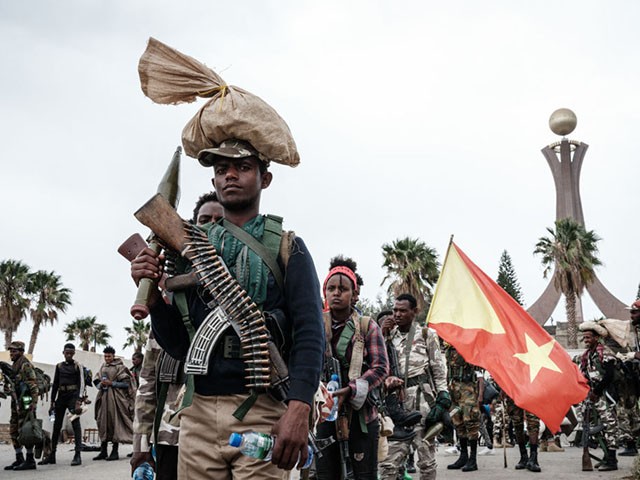
Tigray People’s Liberation Front (TPLF) fighters prepare to leave for another field at Tigray Martyr’s Memorial Monument Center in Mekele, the capital of Tigray region, Ethiopia, on June 30, 2021. (YASUYOSHI CHIBA/AFP via Getty Images)
TPLF leader Debretsion Gebremichael released a letter to the Associated Press on Tuesday announcing the end of the five-month truce, lamenting that “unacceptable conditions have been inserted into the peace process” by the Ethiopian government, halting talks between the two sides. The nation’s military, the letter read in part, “have started a large-scale attack around 5:00 a.m. in the direction of Alamata, southern Tigray.”
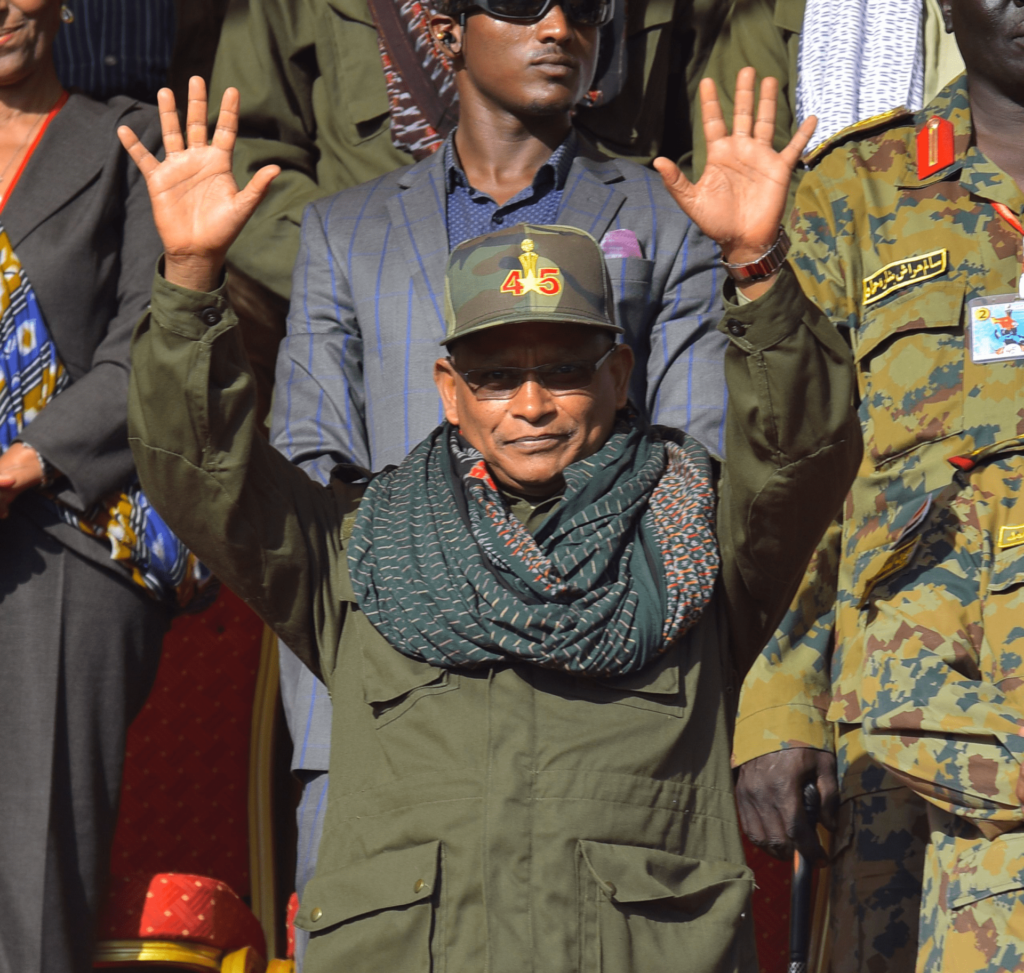
President of Tigray regional government, Debretsion Gebremichael on February 19, 2020, in Mekelle. (MICHAEL TEWELDE/AFP via Getty Images)
Tigray spokesmen reportedly stated that the attackers are both members of the Ethiopian armed forces and members of Amharic militias. Amharic communities have accused Tigray fighters of mass killings and gang rape in Amharic villages, seemingly independent of hostilities directly with the Oromo-led Ethiopian government.
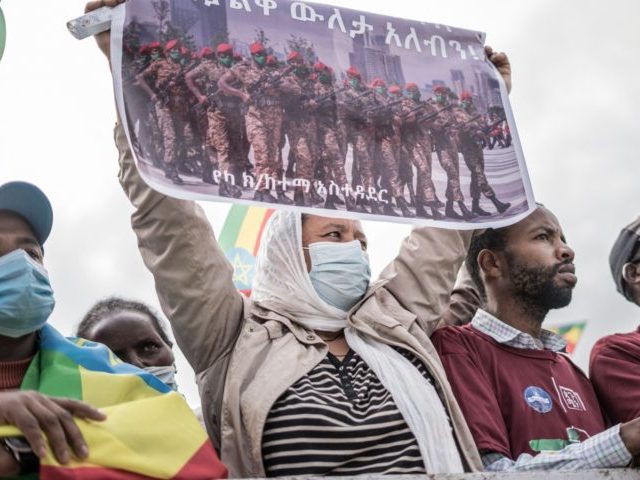
A woman holds up a placard in Addis Ababa, Ethiopia, on September 6, 2021, during a ceremony held to support the Ethiopian military that is battling against the Tigray People’s Liberation Front (TPLF) in the Amhara and Afar regions. (AMANUEL SILESHI/AFP via Getty Images)
In a long missive on Tuesday, the Ethiopian government confirmed that the truce had ended, but lay the blame entirely with the TPLF.
“The terrorist group [the TPLF], along with its foreign supporters, has expressed a strong desire to continue fighting,” the statement read in part. “They have been engaging in acts of harassment in the last six months accompanied by boasting that they will break the siege.”
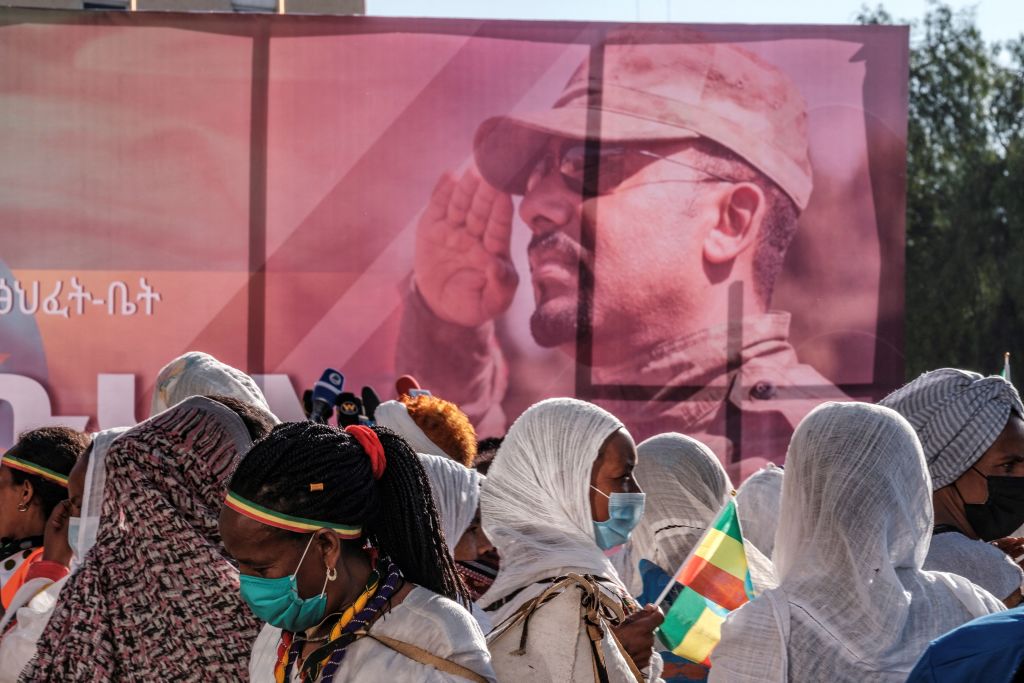
Women stand next to a banner depicting Ethiopia’s Prime Minister Abiy Ahmed during a rally organized by Addis Ababa officials, bringing together artists and athletes headed to visit troops on the front line with rebels of the Tigray People’s Liberation Front (TPLF), in Addis Ababa, Ethiopia, on November 27, 2021.(EDUARDO SOTERAS/AFP via Getty Images)
The TPLF and its allies, the government asserted, “officially broke the ceasefire,” blaming any future violence on the Tigrayans and “international extortionists.” It also claimed, contrary to several human rights organization reports from the region, that it had secured the “transportation of necessary basic materials to Tigray” and created “a favorable environment for streamlined and uninterrupted humanitarian aid to enter the Tigray region.”
While the statement did not specify which foreign actors it was blaming for breaking the truce, it has repeatedly attacked the head of the World Health Organization (W.H.O.), Tedros Adhanom Ghebreyesus, for allegedly fueling violence in Ethiopia.
Tedros, an ethnic Tigrayan, is a longtime TPLF member and served as Ethiopia’s foreign minister and health minister in TPLF governments before leading the U.N.’s top public health agency. Tedros has been among the most vocal advocates for international intervention in the Ethiopian civil war, stating on multiple occasions that global concern for Ukrainian civilians over Ethiopians in wartime is racist.
Tedros has accused the Ethiopian government of causing a “man-made catastrophe” in Tigray by blocking the W.H.O. from offering food and medicine. Tedros said publicly that W.H.O. aid was not entering Tigray in April, in the early days of the truce, and repeated last week his allegation that the government had consistently failed to allow humanitarian aid into the region.
“In the Ethiopian region of Tigray, the drought is compounding a man-made catastrophe for six million people who have been under siege from Ethiopian and Eritrean forces for 21 months, sealed off from the outside world with no telecommunications, no banking services and very limited electricity and fuel,” Tedros said at a briefing last week. “As a result, the people of Tigray are facing multiple outbreaks of malaria, anthrax, cholera, diarrhoea and more. This unimaginable cruelty must end. The only solution is peace.”
“In terms of humanitarian crisis, I can tell you that the humanitarian crisis in Tigray is more than Ukraine, without any exaggeration,” Tedros continued. “And I said it many months ago, maybe the reason is the colour of the skin of the people in Tigray.”
The Ethiopian government accused Tedros in 2020 of privately working to amass support internationally, including securing weapons, to the TPLF, accusations Tedros has denied.
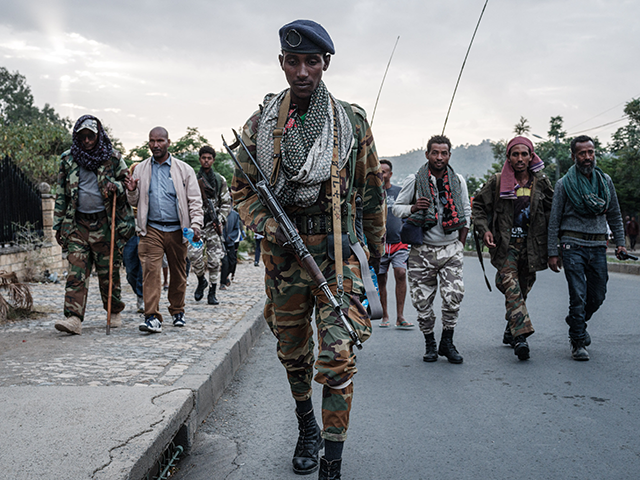
COMMENTS
Please let us know if you're having issues with commenting.